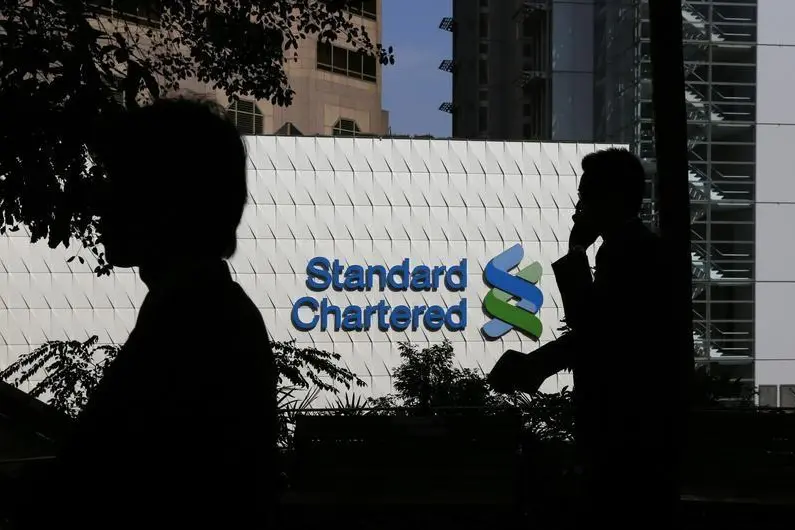PHOTO
Standard Chartered Bank continues to see the Gulf region as "extremely dynamic", despite difficulties caused by the recent oil price drop and political tensions in the region, the bank’s chief executive said this week.
Speaking at the Global Financial Forum organised by Dubai International Financial Centre on Tuesday, Bill Winters said that although the region is "still emerging" from difficulties, there is an "ongoing, supportive investment climate in the region.
"There's certainly coming out of Saudi a reform agenda that's potentially very exciting as that really gathers steam and unfolds. They have to overcome some of the political questions that are flirting around right now," he added.
"I'm not going to pretend to have answers to those questions. If we can draw a line through a lot of the noise which has always been evident in this region... the underground economic story is quite attractive."
He added that it has seen "very little" impact on its business as a result of recent events in the region. He did not elaborate on specific events, but in the past six months these have included a blockade of Qatar by Bahrain, Egypt, Saudi Arabia and the United Emirates due to allegations of state support for terrorist groups (which Qatar denies), the surprise resignation of Lebanese prime minister, Saad Hariri, during a visit to Riyadh earlier this month, and the arrest of over 200 princes and senior business figures on corruption charges.
Discussing the broader reforms programme taking place in Saudi Arabia, such as the Vision 2030 and National Transformation plans, Winters said that these "could be quite supportive for business development".
"There's obviously hurdles that have to be gotten over, but in the meantime it’s business as usual for us and, for most of our clients, it’s quite supportive.
"Our results in this part of the world have been good and we're investing pretty heavily because we think they are going to continue to be good."
Winters was appointed as chief executive of London-based Standard Chartered two years ago and has led a restructuring exercise which saw the bank cut thousands of jobs and raise $5 billion to repair its balance sheet. Losses in Winters' first full year in charge shrunk to $191 million, compared to $2.2 billion in the prior year, and for the first six months of this year the bank declared a profit attributable to shareholders of $1.2 billion.
Winters also said that both Dubai and the United Arab Emirates had made a "phenomenal recovery" since the global financial crisis. However, the picture is not as rosy elsewhere.
Africa a "mixed bag"
Winters described sub-Saharan Africa, where the International Monetary Fund (IMF) has forecast that regional growth in gross domestic product (GDP) is expected to reach just 2.4 percent this year, as a "mixed bag", with the region’s fortunes dragged down by difficulties in its two biggest economies - Nigeria and South Africa.
"But we all see the tremendous opportunity in South Africa over a period of time, and Nigeria is already getting back on track."
He was also upbeat on China, despite ongoing concerns about the level of debt that has built up in the economy. The IMF recently stated that credit to the non-financial sector has more than doubled over the past five years and currently stands at 230 percent of GDP.
Winters said that even with debt-related stimulus stripped out of the economy, China is still growing at a healthy rate of between 4.5-6 percent, and that authorities "have a pretty clear plan to rein in the financial system, to steadily reduce the ongoing cash flow that's going into non-productive industries".
Emerging markets
Speaking in a separate session, the founder and group chief executive of Dubai-based private equity firm The Abraaj Group was also bullish on the prospects for emerging markets, although he described that term as "slightly patronising".
"You cannot lump 150 countries around the world as also-ran and say it's emerging markets. I find the term slightly patronising sometimes and I say that often because the only part of emerging markets that is still emerging is arguably governance and transparency," Arif Naqvi said.
He described them as "global growth markets", stating that two-thirds of overall growth and 100 percent of the growth in consumer goods markets comes from these 150 countries across the Middle East, Asia, Africa and Latin America.
"The average age in growth markets is 26. The average age in OECD markets is 40," Naqvi said.
"When your average age is 26, you want to consume, you want to buy more of everything - whether it's jeans, ice cream or a motorcycle. When you're 40, its spectacles, healthcare and savings. That is why the consumer opportunity is so big in our markets."
He also said that Dubai's main opportunity lay in facilitating trade between these markets.
"South-South trade is higher than it's ever been before, and it is growing. North-north trade is declining," Naqvi said.
"Why is Dubai such a fantastic place to live in? Because its resonance is defined not by virtue of its immediacy in the Middle East. Dubai is a city which has a four-hour connectivity to the majority of the world's population."
© ZAWYA 2017




















